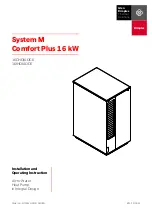
41
Fig. 53 — Single Enthalpy Curve Boundaries
ENTHALPY SETTINGS
When the OA temperature, enthalpy and dew point are below
the respective set points, the Outdoor Air can be used for econ-
omizing. Figure 53 shows the new single enthalpy boundaries
in the W7220. There are 5 boundaries (set points ES1 through
ES5), which are defined by dry bulb temperature, enthalpy and
dew point.
Refer to Table 15 for ENTH CURVE set point values.
The W7220 calculates the enthalpy and dew point using the
OA temperature and humidity input from the OA enthalpy sen-
sor. When the OA temperature, OA humidity and OA dew
point are all below the selected boundary, the economizer sets
the economizing mode to YES, economizing is available.
When all of the OA conditions are above the selected bound-
ary, the conditions are not good to economize and the mode is
set to NO.
Figure 53 shows the 5 current boundaries. There is also a high
limit boundary for differential enthalpy. The high limit bound-
ary is ES1 when there are no stages of mechanical cooling en-
ergized and HL (high limit) when a compressor stage is
energized.
CHECKOUT
Inspect all wiring connections at the economizer module’s ter-
minals, and verify compliance with the installation wiring dia-
grams. For checkout, review the Status of each configured pa-
rameter and perform the Checkout tests.
NOTE: For information about menu navigation and use of the
keypad see Interface Overview on page 32.
Power Up
After the W7220 module is mounted and wired, apply power.
Initial Menu Display
On initial start up, Honeywell displays on the first line and
economizer W7220 on the second line. After a brief pause, the
revision of the software appears on the first line and the second
line will be blank.
Power Loss (Outage or Brownout)
All set points and advanced settings are restored after any pow-
er loss or interruption.
NOTE: All settings are stored in non-volatile flash memory.
Status
Use the Status menu (see Table 9) to check the parameter val-
ues for the various devices and sensors configured.
NOTE: For information about menu navigation and use of the
keypad, see Interface Overview on page 32.
Checkout Tests
Use the Checkout menu (see page 37) to test the damper opera-
tion and any configured outputs. Only items that are config-
ured are shown in the Checkout menu.
NOTE: For information about menu navigation and use of the
keypad, see Interface Overview on page 32.
To perform a Checkout test:
1. Scroll to the desired test in the Checkout menu using the
▲
and
▼
buttons.
2. Press the
(Enter) button to select the item. RUN?
appears.
3. Press the
(Enter) button to start the test. The unit
pauses and then displays IN PROGRESS. When the test is
complete, DONE appears.
4. When all desired parameters have been tested, press the
(Menu Up) button to end the test.
ECONOMIZING
AVAILABLE
NOT AVAILABLE
ENTHALPY
RA
HUM (%RH)
RA
TEMP
TEMPERATURE
ABSOLUTE HUMIDITY
ES5
ES4
ES3
ES2
ES1
HL
P1
(T,RH)
P2 (T,RH)
SINGLE ENTHALPY
DUAL ENTHALPY
HIGH LIMIT
Table 15 — Single Enthalpy and Dual Enthalpy High Limit Curves
ENTHALPY
CURVE
TEMP. DRY
BULB (F)
TEMP.
DEWPOINT (F)
ENTHALPY
(btu/lb/da)
POINT P1
POINT P2
TEMP. (F)
HUMIDITY
(%RH)
TEMP. (F)
HUMIDITY
(%RH)
ES1
80
60
28.0
80
36.8
66.3
80.1
ES2
75
57
26.0
75
39.6
63.3
80.0
ES3
70
54
24.0
70
42.3
59.7
81.4
ES4
65
51
22.0
65
44.8
55.7
84.2
ES5
60
48
20.0
60
46.9
51.3
88.5
HL
86
66
32.4
86
38.9
72.4
80.3
Summary of Contents for Preferred 549J 04
Page 4: ...4 Fig 2 549J 04 06 Units Built On and After 4 15 2019...
Page 5: ...5 Fig 3 549J 04 06 Units Built Prior to 4 15 2019...
Page 6: ...6 Fig 4 549J 04 06 Corner Weights and Clearances...
Page 7: ...7 Fig 5 549J 04 06 Base Rail Details...
Page 8: ...8 Fig 6 549J 04 06 Thru the Base Charts...
Page 23: ...23 Fig 41 Electro Mechanical Control Wiring 208 230v 460v...
Page 24: ...24 Fig 42 Electro Mechanical Control Wiring 575v...
Page 25: ...25 Fig 43 Electro Mechanical Power Wiring 208 230 1 60...
Page 26: ...26 Fig 44 Electro Mechanical Power Wiring 208 230 3 60...
Page 27: ...27 Fig 45 Electro Mechanical Power Wiring 460 3 60...
Page 28: ...28 Fig 46 Electro Mechanical Power Wiring 575 3 60...








































